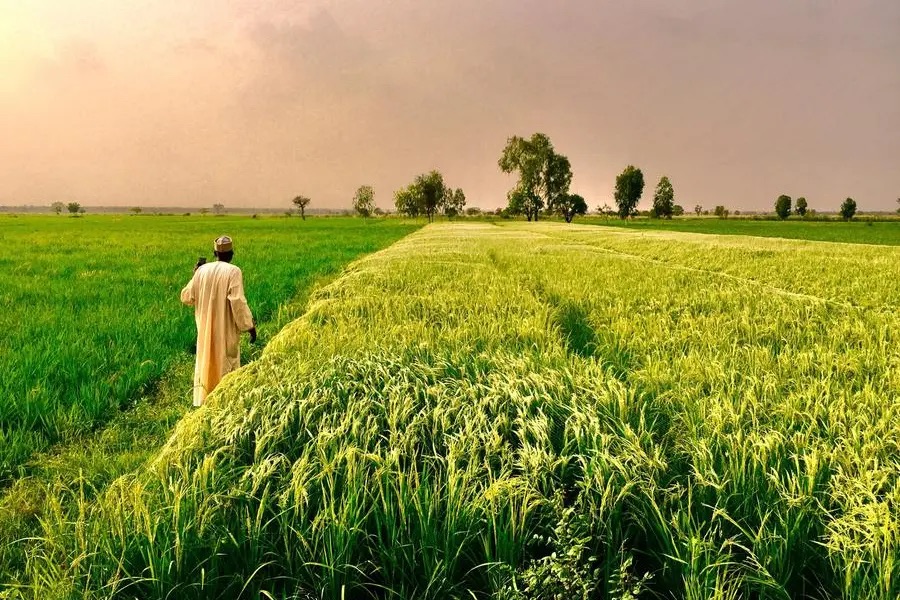Photo Taken In Kura, Nigeria. Getty Images/EyeEm Image used for illustrative pupose.
Kanangire has said that mechanisation is very critical in achieving food security in Africa.
Dr Kanangire who stated this while interacting with journalists during his visit to Abuja, said Mechanisation actually is one area where Africa is not doing well, and farmers are frustrated due to the nature of farming which has been hectic.
“So now, Mechanisation is critical to achieving food security, and prosperity through agriculture. We are encouraging it in different ways at AATF. A decade ago, we piloted what was called the Cassava Mechanisation and Agro-processing Project (CAMAP) which was active in Nigeria, in Zambia, in Uganda, and Tanzania.
“Piloting to show that it is possible that it can improve things, what comes from the cassava sector with mechanization is that it is not that only the farmer could cultivate a bigger space because they are using tractors, it is also that it improved agricultural technology in a way; agronomic practices and improved the productivity from seven to nine tonne per hectare to 25 even more times per hectare.
“So by Mechanisation, using it to prepare the land, plant and harvest was very beneficial. And it reduced the time spent by the family on the farm. Here in Nigeria, we have continued that same initiative that we started with CAMAP, we have what we call Agridrive, it is a company which provides Mechanisation services to farmers, including the smallholder farmers who cannot buy their own tractors.
He said AATF is integrating different services. He added that with those tractors, the Foundation is ploughing, harrowing, planting and harvesting.
Related News Youths in Ondo urged to embrace agriculture Oxfam tasks incoming govt on 10% budget allocation to agriculture Outspan vaccinates local cattle against foot, mouth disease
“So, all the services can be mechanized. And we have another process which can allow the farmer to take the products and put them into the processor and produce flour for human consumption and for animal consumption. With this, we can reduce the post-harvest loss that we normally have with a product like cassava”, he said.
Speaking on food security in the continent, Dr Kanangire said Africa is far from ending hunger, and still far from ending poverty, but a lot of progress has been made.
He said Africa has made a lot of progress and there are some countries that have even implemented most of the targets that were set by the Malabo Declaration.
“I’m very keen to follow every two years what is called the scorecard of the African continent in agriculture. Yes, as Africans, I feel that we should be doing much more, but we have been quite progressive in doing it.
“What we need to do in the two years, I think the pace of transformation should not be a uniform type of speed, we should accelerate and adopt the changes that are needed to really revolutionise the agricultural sector.
“And if we do, instead of going through the ordinary path, but jump, have the leapfrog towards what we want, I think the two years we can make some progress and have a stronger foundation when we will be evaluating what the 25 years we have brought to Africa and take new commitments on the basis of strong lessons that we will have learnt from this period and strong commitment that we will have taken from different summits, different high level meetings that our leaders have been taking.
“I will only take this opportunity to urge our decision makers or policymakers and also private sector people because it can’t be done by only one sector. I want to ask them to use the two years to really ensure that we expedite the transformation that we need.
“We put together the ingredients that will make changes and that we will charge our batteries for the next 20 years or so to make a greater difference in the agricultural sector. I believe that unless we develop agriculture and make it an economic sector, Africa’s development will be very difficult to attain. Remember, more than 60% of our people are in agriculture.
“And unless we change, we will not be able to develop our content. Remember, women and youth are not very much empowered unless we manage to equip them with the right technology and the right knowledge and the right access to production factors that would not be able to change this content. So that is my appeal to the leaders of this continent”, he added.


